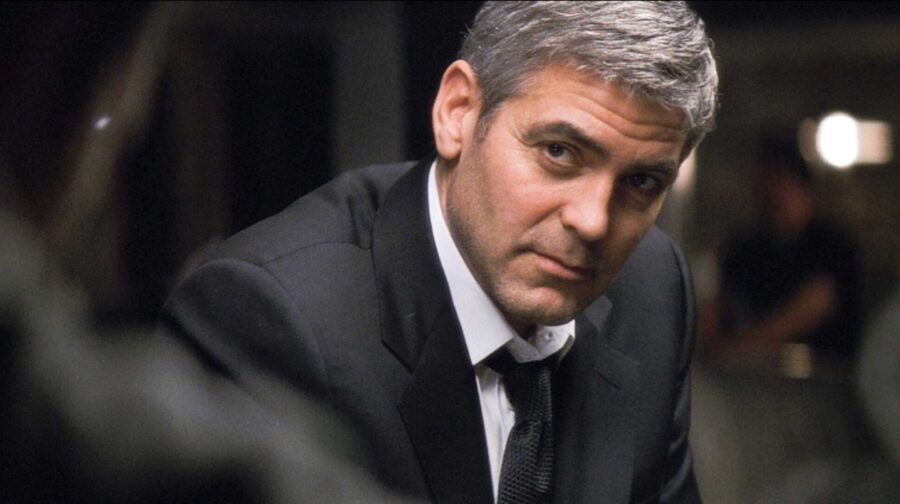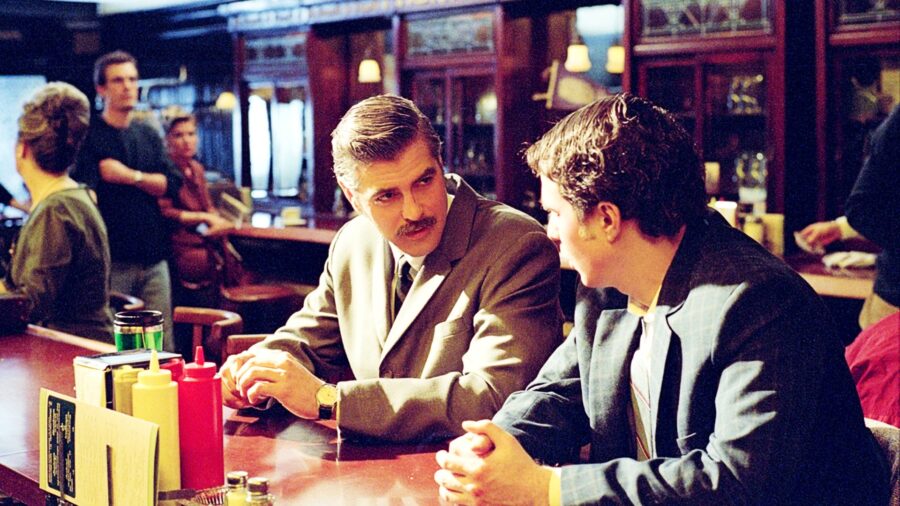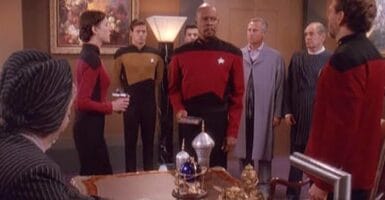A Forgotten George Clooney Movie Is Worth Revisiting For Its Bizarre True Story
A forgotten George Clooney movie is worth taking another look at, if only for its bizarre, confusing, and (maybe) true story.
This article is more than 2 years old

When an actor has become successful enough, it seems like there is a natural tendency to want to become a director. It makes sense; after you’ve been told where to stand and what to say and had one of those clapboard things clapped in front of your face for long enough, you probably want to be on the other side of things for once. For George Clooney, that time came in the early 2000s. He had spent the 1980s slogging his way through undistinguished B-movies, the 1990s climbing the hill of television with ER, and made a detour around 1997 to be the worst Batman. Then from 1998 on, he had a golden run with critical acclaim from Steven Soderbergh’s stylish Out of Sight and David O. Russell’s Gulf War drama Three Kings, huge box office hits with The Perfect Storm and O Brother, Where Art Thou?, and all of it all at once with the absurdly fun and successful Ocean’s 11. At that point, Hollywood would have let George Clooney do just about anything. And so he decided to make Confessions of a Dangerous Mind.

George Clooney made his directorial debut with Confessions of a Dangerous Mind, which in theory is based on a memoir of the same name by a man named Chuck Barris (played in the film by Sam Rockwell). We say in theory, because not only are the facts of Barris’ account of his life very much in dispute (and were frequently contradicted by the man himself over the course of his life), the screenplay was by Charlie Kaufman, Hollywood’s preeminent writer of unreliable, meta-referential protagonists. Barris’s memoir was first published in 1984 had run through the classic narrative of development hell, first landing at Columbia Pictures, then moving to Warner Bros. Initially, Curtis Hanson, the director of archetypal 1980s psychological thriller The Hand That Rocks the Cradle, was set to direct from Kaufman’s script. Then it was My Best Friend’s Wedding’s P.J. Hogan. Then Sam Mendes, David Fincher, Brian De Palma and Darren Aronofsky. At various points, Barris was set to be played by Richard Dreyfuss, Sean Penn, Ben Stiller, Johnny Depp, Russell Crowe and Kevin Spacey. In short, it was the kind of project everyone in Hollywood loved, but no one could get made. Until George Clooney came around.
What made both George Clooney’s film and the memoir of Confessions of a Dangerous Mind so compelling was the bizarre nature of Chuck Barris’ claims. He was a well-known television personality in the 1970s on the loud talent show spoof The Gong Show, which he hosted contestants performing odd feats for Z-list judges. Prior to that, Barris had written a minor hit pop song called “Palisades Park” and had created The Dating Game and The Newlywed Game for ABC as well as a number of less notable shows, but his memoir claimed that while he was producing these shows, he was also employed by the Central Intelligence Agency as a Cold War Assassin. According to him, he had killed 33 people in the service of Cold War wetwork operations.

You can see why this extremely wild claim would excite Hollywood, and also why it took a star the magnitude of George Clooney to get it made. The CIA has always denied that Barris was ever employed by them, but how could you really believe that they would tell the truth about what were described as clandestine, extralegal killings? The film of Confessions of a Dangerous Mind flashes back and forth through Chuck Barris’ life, with Sam Rockwell variously appearing as a fresh-faced ABC page working for Dick Clark, a steely-nerved Cold War killer, and a bearded, burnt-out wreck of a man holed up in a dingy hotel. George Clooney plays a supporting role as Barris’ mustachioed handler Jim Byrd, who seems so much like a physical manifestation of CIA omnipresence that you begin to question the reality of his presence. But then again, it’s a Charlie Kaufman screenplay based on a memoir by a man who may or may not be telling the truth about a life with an agency that trains its operatives to disguise themselves. Who’s to say?

It is clear that Confessions of a Dangerous Mind is George Clooney’s first film. While he may have already been an extraordinary movie star (and pretty good actor), Clooney falls prey to the usual temptations of a neophyte filmmaker. He employs every trick in the book, shifting from black and white to color to deeply saturated color, alternating timelines, smash cutting, and using canted angles like there’s no tomorrow. Fortunately, it actually works with this movie, which purports to be the ramblings of a deeply troubled and mentally broken man. Combined with a stellar supporting cast (courtesy of George Clooney’s star power) of Drew Barrymore, Julia Roberts, Maggie Gyllenhaal, and a quick appearance by Ocean 11 pals Brad Pitt and Matt Damon. Confessions of a Dangerous Mind received decent reviews and a middling box office and was generally treated like a superstar’s pet project (which it kind of was). But that doesn’t mean it also wasn’t secretly fascinating.












